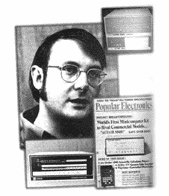A
[HI]STORY[-TELLING] OF HACKER CULTURES
·
Year Zero (!)
· 1967
PDP-10 - Hacker ethic - ARPAnet
· The
1970s
Community Memory Group - Felsenstein - Birth of computer underground - Blue
Box and Apple
· The
1970s
The rise of Unix
· The
80s
Phrack - Free Software Foundation - 2600
· The
90s
The "hacker crackdown" and after - The Intel 386 chip - Linux
- DeCSS |
1970s:
The ARPAnet and the PDP-10 cultures grew throughout the 1970s. The facilities
for electronic mailing lists that had been used to foster cooperation
among research groups were increasingly also used for social purposes.
Also, computers come out of university labs and went into the street.
This actually happened in a performance of the Community Memory
Project, a group of hackers and activists that got together in
California in the mid-70S, which believed that computers were communication
media that could help people to get in touch with one another in an unprecedented
way.
Computers thus began to be seen as a social tool, and
therefore also as able to carry political values.
At the same time, computers were still largely feared as the most sophisticated
tools of authority. They were still seen as part of the military machine
that was responsible for the Vietnam War.
|
|
| |
|
The anarchic and freedom
traits of computer hackers seemed able to fit the cultural fabric of californian
counterculture. Also they seemed able to renuvate the hyppie dream.
Felsenstein was able to persuade activists of the Free Speech
Movement that computers could become tools of democracy, and
that in order for this to happen people should have started to put their
hands on them. He basically brought the hacker’s ethic outside the
AI of the MIT.
The birth of computer Underground
The most creative, anarchist, dark-side of the political and artistic
communties began to undestand the potential of Technology.
The genuine roots of the modern hacker underground can probably be traced
most successfully to a hippie anarchist movement known as the Yippies.
The Yippies, who took their name from the largely fictional "Youth
International Party," carried out a loud and lively policy
of surrealistic subversion and outrageous political mischief.
Their basic tenets were flagrant sexual promiscuity, open and copious
drug use, the political overthrow of any powermonger over thirty years
of age, and an immediate end to the war in Vietnam, by any means necessary,
including the psychic levitation of the Pentagon. The
two most visible Yippies were Abbie Hoffman and Jerry
Rubin.
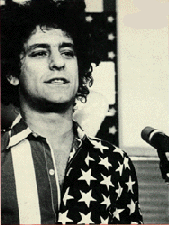
Abbie Hoffman
Yippies regarded electronic media as both playground
and weapon. They enjoyed manipulating network TVs and other gullible,
image hungry media, with various weird lies, mindboggling rumors, impersonation
scams, and other sinister distortions.
Hoffman's most famous work is a book knwon as Steal This Book,
which publicized a number of methods by which young, penniless hippie
agitators might live off the fat of the system.
Steal This Book, whose title urged readers to damage the very means of
distribution which had put it into their hands, could be seen as a spiritual
ancestor of a computer virus or of a media hack.
Phone phreaking
Hoffman, like many later conspirators, made extensive use of pay- phones
for his agitation work -- in his case, generally through the use of cheap
brass washers as coin-slugs.
During the Vietnam War, there was a federal surtax imposed on
telephone service.
Hoffman argued that in systematically stealing phone service they were
engaging in civil disobedience: virtuously denying tax
funds to an illegal and immoral war.
1971: Abbie Hoffman and a telephone enthusiast sarcastically
known as "Al Bell" began publishing a newsletter called Youth
International Party Line. This newsletter was dedicated to collating
and spreading Yippie rip-off techniques, especially of phones.
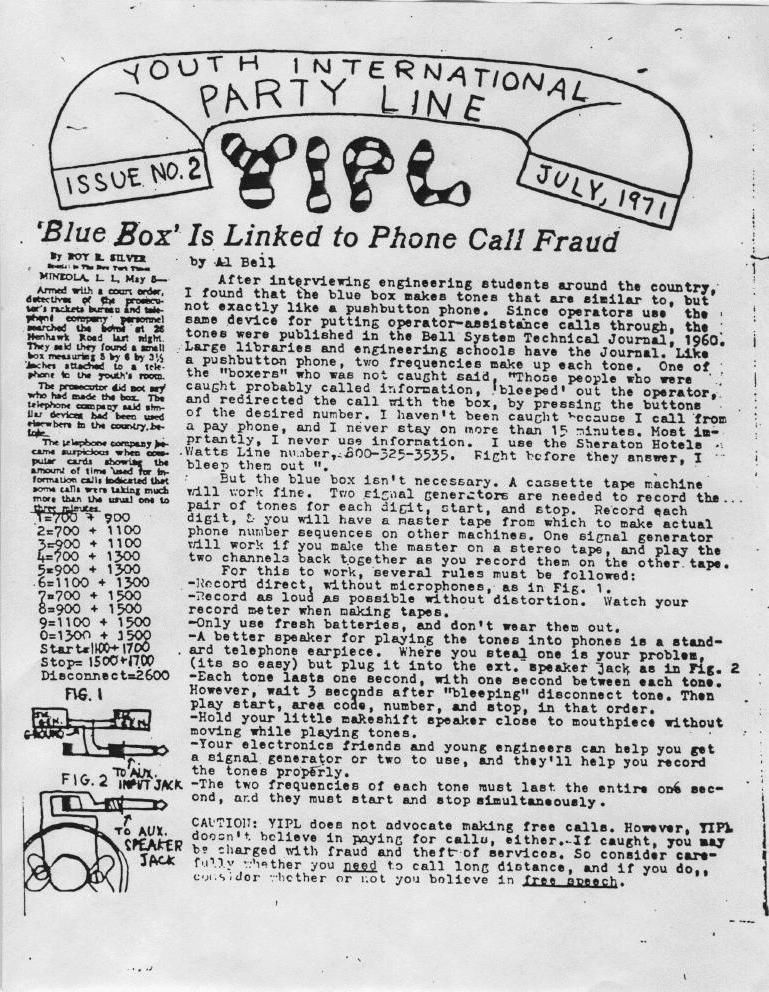
Youth International Party Line, the YIP newsletter
As a political tactic, phone-service theft ensured that Yippie advocates
would always have ready access to the long-distance telephone as a medium,
despite the Yippies' chronic lack of organization, discipline, money,
or even a steady home address.

Captain Crunch, Phone Phreaking pioneer
Because the phone network pre-dates the computer network, "phone
phreaks" pre-date "computer hackers." In practice, today,
the line between "phreaking" and "hacking" is very
blurred, just as the distinction between telephones and computers has
blurred. Phreaking could be seen as the early form of modern days cracking.
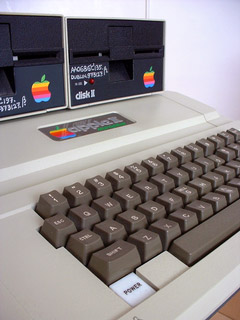
1977: Apple is founded. The first computers had a blue
box, the phone-phreakers tool, a device for a modem. Captain Crunch,
inventor of the blue box, was a good friend of Steve Wozniak.
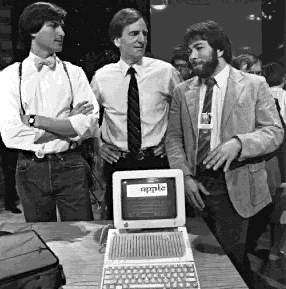
< previous
| next > |
|


